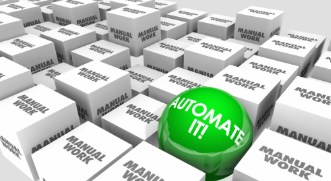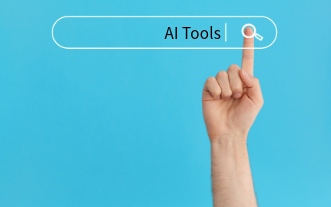Implementing AI at Your Staffing Agency in 2024
January 23, 2024
AI. One of the most buzzed words in 2023. You saw it in articles, on the news, in webinars, in sessions, and at conferences. Almost daily you heard about AI and the importance of using it. Now we are in 2024 and AI isn’t going away. The buzz of those fateful two letters will keep buzzing about and consume our thoughts.
When some people hear the words “AI”, they want it right away, like a shiny new object, without even knowing exactly what it is and how it can help. Then others are tired of hearing about AI, think it’s overrated, and want to continue using their current processes that are working well. Lastly, there may be some people that are indifferent about it. It sounds cool to them, perhaps if the mood strikes, they will look further into it.
Which category are you in?
No matter which category you are in, one thing we know is that AI is not going away in 2024 and its capabilities will continue to rapidly advance. While this may sound scary and like AI is taking over the world, there can also be many benefits and advantages to embracing the technology at your staffing agency in 2024. In this article, we will look at what AI is, if AI is just a buzzword and nothing more, how AI in a staffing agency can streamline workflows, if you should implement it in 2024 and how to implement it, and lastly, we will look at what to be aware of.
Embracing AI in Staffing

AI is here and it’s here to stay. AI has been one of the most explosive topics in 2023, particularly after the launch of ChatGPT® in November 2022. Everybody has been talking about it since. While you may or may not be in favor of the concept of AI, it is not going anywhere, and its capabilities will continue to develop. As staffing companies adapt to incorporating AI into their business, they will see firsthand the advantages of using it. AI in staffing agencies is going to become the norm, and the best business move to make is to embrace it while the concept is still relatively new and the possibilities have not been entirely explored.
If you are not in favor or are hesitant about using AI in staffing, the first step is embracing that it is here to stay. The second step is being educated on the advantages of using it at your staffing company and the potential ways you could incorporate it into your everyday processes. By embracing and educating yourself, you are doing your due diligence by seeing if this is something you should pursue at your staffing company.
Okay, the Concept of AI in Staffing is Embraced, but What is AI Exactly?
When you think of the term AI by itself, it is very broad. When someone says you should incorporate AI at your staffing agency, what does that even look like? Let’s take a step back and look at what AI is.
The official Britannica® definition of Artificial Intelligence is the ability of a digital computer or computer-controlled robot to perform tasks commonly associated with intelligent beings. Another definition by G2 defines Artificial Intelligence Software as software that imitates human intelligence and performs tasks that require human cognitive skills. Both definitions give us a good understanding and reminder of what AI is.
AI can further be broken down into different types of AI, such as Conversational Intelligence (Chatbots), Generative AI (AI Writing Assistants), Machine Learning (Automation of Rule-Based Tasks or Emails), etc. These are a few of the AI categories we will be looking at for this article.
So, is AI just a Buzzword, or Can it Drive Results at Your Staffing Agency?

The big question that staffing agencies and everyone in business are asking themselves is if AI is just a buzzword or if it will drive results. What changes when you add AI into staffing processes?
The Benefits of AI in Staffing Agencies
1. Automating Tasks
The most obvious advantage of incorporating AI into your staffing processes is the ability to automate tasks. Whether that is automated emails, text messages, conversational chatbots, etc., tasks can be automated to both eliminate tasks and deliver the right message at the right time to candidates and clients. This is one of the most immediate, obvious benefits of AI in staffing, saving your employees time on easily repeatable tasks like this.
2. Saving Time
By automating tasks, you get more time back in your day to focus on the core of your business and strategy. The same can hold true for the rest of the team, whether you are a recruiter or a salesperson, more time can be focused on connecting with candidates and clients, prospecting for new business opportunities, increasing customer satisfaction/retention, and more. The tasks that are being automated can also set you up to do some of these tasks even better. AI in staffing essentially allows your people to put more focus on the human side of staffing, while automation handles a lot of the busywork.
3. Eliminating Mundane and Repetitive Tasks
By automating tasks, you are given the opportunity to also eliminate mundane and repetitive tasks. Think of your everyday to-do list and the items on it that you would be able to automate. These everyday tasks, such as writing job descriptions, can be automated so you can focus your time on other important items that can’t be automated.
4. Intelligent Candidate Matching and Prospecting
AI can also be used to identify and rank the best candidate for a job. This goes back to not only saving time, but some may argue its capabilities to match candidates can even be greater than a human’s capability. For sales as well, companies are using AI in staffing to identify prospects and forecast future opportunities.
5. Training and Role Playing
AI is also being used to train and practice scenario-based role-playing. This allows you to practice scenarios with a candidate or client and the responses they might have back to you. It’s a great way for recruiters and sales executives to use an AI software, such as ChatGPT, to role-play different scenarios they might find themselves in.
What AI Looks Like in Staffing
 As we can see, AI might be more than a buzzword, and it can have some direct impact on staffing businesses and their processes. So far, we explored some of the overall benefits AI can have. In this section, we will take a look at some more specific examples of ways you can use AI at your staffing company.
As we can see, AI might be more than a buzzword, and it can have some direct impact on staffing businesses and their processes. So far, we explored some of the overall benefits AI can have. In this section, we will take a look at some more specific examples of ways you can use AI at your staffing company.
1. Writing of Job Descriptions and Emails
AI can be used to write job descriptions, emails, email templates, etc. It takes time to come up with creative and enticing job descriptions and emails. AI can do that work for you. The job description and email might not be exactly what you are looking for, but it could always give you a good template to start with and you can make any specific adjustments needed. If you are looking to start small, you could give it a try through free AI tools, such as ChatGPT or the Grammarly® AI Assistant tool. If you are a HubSpot® user, HubSpot also has AI tools to write emails, blogs, social media posts, etc.
2. Automated Emails and Text Messages

Emails and text messages can also be automated based on certain rules and scenarios you set. Candidates and clients can receive messaging based on actions they take or based on where they are in your process. A candidate can automatically receive a text message reminder about their assignment the day before their first day and they can receive a check-in text after their first week of work. All your communication can be meaningful and relevant by creating this automation. It also can save the team many hours by eliminating writing and sending messages one at a time. Instead, rule-based messages are set up once, and automation does all of the work.
Pro Tip: Our partner, Sense®, is a vendor in the staffing industry that you can partner with for automated email and text messaging. Sense connects directly with Ultra-Staff EDGE, so all of the candidates and contacts in your database are automatically connected and all notes are logged within Ultra-Staff EDGE when a message is sent.
3. Chatbots
A chatbot can come in handy when a recruiter isn’t available to talk, for example, during after-hours. An AI staffing chatbot can be set up on your website to field candidate or client questions that are coming in. This way, no messages are missed, and you can continue to engage with candidates and clients outside of work hours. Some chatbots also can screen candidates, so when the recruiter begins work the next day, the candidate from the night before was already pre-screened.
Chatbots can also be used during working hours if no one is available to chat or at least to start a conversation to gather information before directing it to a person to speak with. Chatbots can also be used to communicate with more people if multiple inquiries come in at once and you don’t have the bandwidth to field the communication. Many vendors offer chatbots, including our partner Sense, and HubSpot.
4. Candidate Matching and Ranking
If you want to save your recruiters time from going manually through hundreds of resumes, AI staffing tools can sort through resumes, identify which candidates are a match for a position, and rank them. This can save hours, especially if you have many applications coming in each day.
5. Identifying Prospects and Forecasting
There are also AI staffing tools that can be used for sales to help identify qualified prospects and assist in the sales planning process by forecasting new deals, renewals, etc. These types of tools can help sales teams plan and target the right prospective customers.
6. Pre-Screening and AI-Powered Interview Tools
AI staffing tools can also be used to pre-screen candidates and schedule interviews. In the interview through certain platforms, notes and interview summaries are put together. These types of tools save time pre-screening candidates and scheduling interviews. It also saves time after the interview with the automatic notetaking and summaries being provided.
Should You Implement AI in Your Staffing Agency in 2024?

We reviewed the benefits of AI in staffing and some of the specific use cases available. While we reviewed a handful of benefits and scenarios for using AI in staffing, there are many different use cases and ways AI can be used that might not even be covered in this article. The big question though that it all comes down to is whether you should implement AI in 2024.
Many experts say if you don’t implement AI in 2024, you will fall behind and that it will soon become a necessity to implement it.
When deciding whether to implement, think about your goals. What would be the main reasons you would implement AI into your processes? What challenges, problems, or efficiencies are you looking to improve? This will help give you an idea of what kind of AI staffing services you would be looking for. It’s important not to implement AI just because you feel like you should implement it. See how it would fit into your processes and if it makes sense to implement.
How to Implement AI at Your Staffing Company
After you define the reason for implementing AI and your goals, find a vendor partner that can help you meet your goals.
If You Want to Start Small
If you want to start small with a free tool, you can easily adapt ChatGPT into your processes. It can be used as an AI writing assistant for job descriptions or emails. It can also be used as a training and role-playing tool. Implementing a free tool like ChatGPT, Grammarly, or Google’s® new Bard AI tool, are ways you can implement AI without any upfront costs or strings attached.
If You are Looking to Implement a Robust AI Tool
 If you are looking for an AI tool with more bells and whistles, you can use a reputable software review site like G2® to look up vendors that offer the AI tools you are looking for. I would also recommend reaching out to your local staffing association and associations like the American Staffing Association and the National Association of Personnel Services to see if there are any staffing-specific AI vendor partners you could work with. A staffing-specific AI tool could offer staffing and recruiting tools tailored more for your business.
If you are looking for an AI tool with more bells and whistles, you can use a reputable software review site like G2® to look up vendors that offer the AI tools you are looking for. I would also recommend reaching out to your local staffing association and associations like the American Staffing Association and the National Association of Personnel Services to see if there are any staffing-specific AI vendor partners you could work with. A staffing-specific AI tool could offer staffing and recruiting tools tailored more for your business.
Outline Specific Policies and Procedures
Before implementing any AI tool at your company, it will be critical to outline a plan for using it and policies and procedures. You want everyone to use the technology correctly and not abuse it, for example, using an AI writing assistant tool for EVERYTHING. Specific use cases and procedures must be outlined to ensure everyone is using it the same way and to ensure transparency. This will also help protect your staffing agency from ethical issues that could arise and biased data (see below section for more information on ethical and biased data concerns with AI.)
What to be Aware of Before You Implement AI in Your Staffing Agency
With any new technology, but specifically AI, you want to be aware of the drawbacks and AI-related laws to ensure you stay compliant. Before you implement AI, be sure you are aware of the below.
1. Remember It’s Not a Human Voice
When using AI as a writing assistant, it’s important to remember it is not a human voice and that they also don’t work at your staffing agency. Proofread everything and modify it if necessary. Does it sound like a human voice? Are there any specific details missing that are important to include that an AI writing assistant wouldn’t know to include? AI is great, but it is certainly not perfect. It’s important to still use our human brains to proofread and identify details that are missing.
2. Transparency

Depending on what kind of AI tools you are using, each tool is machine-trained differently. Sometimes it may be unclear where or how the information was gathered and if it is accurate. Going back to an AI writing assistant tool, if you ask it to write a job description for a clerical position, it certainly will do that, but it gathers and improves its response based on history and previous information gathered. This is why it’s important to proofread everything if using it as a writing assistant and use your knowledge as a staffing professional if something doesn’t sound right. No matter how authoritatively your AI staffing tool writes the description, you are still the subject matter expert, and it’s important to keep that in mind.
Another example is if you are using it for pre-screening and candidate/job matching. It’s hard to know if the AI tools are disqualifying candidates incorrectly. If you see many candidates being qualified that aren’t qualified, that would be an indicator that something might not be working correctly. However, it’s possible an AI tool would disqualify a candidate that you would normally qualify. You won’t know if this happens unless you are also “double-checking” the AI staffing tool’s work.
3. Lack of Creativity
AI is trained and uses machine learning to gather information. AI is not creative and won’t think outside of the box. You can use AI to your advantage to gather ideas and information, and it may explore things from a perspective you hadn’t considered, but it won’t necessarily be the most creative thinker in the room.
4. Ethical Concerns
There are some ethical concerns with AI, including copyright concerns and data privacy violations. The sources AI uses to generate information can be unknown in certain circumstances generating concerns for copyright risks. There can also be data privacy concerns if personal information is gathered in a data set.
5. Biased Data
Another major concern with AI is biased data being gathered. AI is based on large data sets and patterns, which could potentially lead to discriminatory results. It’s important to be aware of this when using AI and monitoring results. If your AI-generated data seems skewed in any way, it may be affected by biased data.
6. It’s an Investment and Trial
As with any new product, you have to see what works. After implementing an AI tool, see if it is driving the results you are looking for and meeting your goals. If not, you can take a different direction and try a new strategy.
Your Next Steps with AI in Your Staffing Agency
We unpacked a lot in this article, and it may be a bit overwhelming to come to terms with all the possibilities that AI in staffing agencies can bring. From understanding AI’s fundamentals and its strategic application to recognizing its potential pitfalls, we’ve put you in a good place to make your decisions about AI’s role in your staffing agency. The journey ahead is yours to navigate, armed with insights on harnessing AI to streamline staffing practices.
If you’re on the fence, we’d love to speak with you about the possibilities as they pertain to your staffing agency. As is the case in everything related to the staffing industry, the same solution won’t work for every agency, and you may have some questions about the benefits and downfalls that it can bring to your agency, for which we would be happy to help.
Want to learn more about how you can implement AI at your staffing agency in 2024? Contact Ultra-Staff EDGE Staffing and Recruiting Software to learn about tools available to you.
Written by Jennifer Roeslmeier Mikels
 Jennifer Roeslmeier Mikels is a Sr. Digital Marketing and Brands Manager at Automated Business Designs, developers of Ultra-Staff EDGE Staffing Software. Jennifer regularly publishes articles about key topics surrounding the staffing industry with both local and national staffing associations.
Jennifer Roeslmeier Mikels is a Sr. Digital Marketing and Brands Manager at Automated Business Designs, developers of Ultra-Staff EDGE Staffing Software. Jennifer regularly publishes articles about key topics surrounding the staffing industry with both local and national staffing associations.

